The October 5th Interfaith Alliance meeting will be held in Room 27, at Augustana Lutheran Church, 2710 NE 14th Street, from 12:00 - 2:00 PM.
Rev. Mark Knutson, Pastor Augustana Lutheran Church
The October 5th Interfaith Alliance meeting will be held in Room 27, at Augustana Lutheran Church, 2710 NE 14th Street, from 12:00 - 2:00 PM.
Rev. Mark Knutson, will reflect on "Poverty in Portland”, as he has experienced it through his 22 years as pastor of Augustana Lutheran Church.
He advises that he came to Augustana in 1995 in response to "God’s call and the possibility of growing a multicultural congregation that is unafraid to step out in faith on the important issues of our day for the well being of all."
He says that the biggest challenge now is "Discerning what the cutting edge issues of justice, peace, diversity, equity, reconciliation and inclusion are going to be and helping to position the church to be ready and relevant to be proactive with others as a voice of conscience and a move in action always ready to step out in faith to do what is right."
Following Rev. Knutson’s remarks, Interfaith Alliance Co-Chair, Carol Turner, will lead a discussion of ways the Alliance may work to improve poverty awareness and assist those in poverty during coming months
SMALL STEPS, RESPECT & A $20 BILL -- Based on Presentation by Israel Bayer, Executive Director of Street Roots, and Lori Lematta, Street Roots Vendor , by B. Gregg
When Street Roots Executive Director, Israel Bayer, spoke to a meeting of the Interfaith Alliance on Poverty, held at the Madeleine Church, on August 31st, he was asked how the Interfaith Alliance could help the homeless. Israel said, “Small steps, they make a difference.” He also emphasized the importance of treating everyone with respect.
In the last month, we have witnessed how hurricanes, fire, earthquakes. and flood can render people homeless. In the blink of an eye, the accumulations of a lifetime are gone. We all grieve and dig deep in our pockets to help as we can.
Those surviving on the street of Portland may have survived circumstances every bit as harrowing as a hurricane or earthquake, but that is not how we perceive them. We are more inclined to view them as victims of their own making We look away, not wanting to touch or be touched, afraid to admit our common humanity, to see ourselves in them and realize that “there but for the grace of God go I.”
Israel explained that our current level of homelessness was caused by the confluence of many factors: the elimination of Federal low cost-housing, the rise in property values and rent, the decrease of affordable housing, the de-institutionalization of the mentally ill, the rise of veterans produced by middle east wars, the increase in addiction, and the impact of the 2008 recession causing women and families to join the ranks of the homeless, etc.
In his September 1, 2017 Street Roots editorial, Israel wrote:
“We're making a difference on homelessness, even if it's hard to see. For every person the system finds housing for, there are more people becoming homeless
“Thinking about solving the issue of homelessness can feel almost impossible. For the general public it’s hard to understand the relationship that nonprofits and government play in working to give people a safe place to call home. It’s understandable. Why, after spending all of this money, are people still sleeping on our streets? It’s a valid question.
“If you commute into downtown every day for any length of time, it may be hard to notice a difference in the numbers of people that are visibly homeless. It’s because you’re probably not.
“Let me explain.
“We do know how to give people a safe place to call home.
“Last year, both Portland and Multnomah County helped nearly 5,000 individuals and families find housing placements in the region. An additional 6,000 people received prevention services, such as rent assistance, to help them stay in housing.
“What the public doesn’t always see is that for every person the system finds housing for, there are more individuals and families becoming homeless on what feels like a daily basis. The struggle is real.
In short, the reason you’re not seeing a visible difference in the homeless population isn't because we don’t know how to house people; it’s because we can’t stop the flow of people hitting our streets.
“In short, the reason you’re not seeing a visible difference in the homeless population isn't because we don’t know how to house people; it’s because we can’t stop the flow of people hitting our streets. Of course, any logical human being understands that when you have the kinds of rent increases the region and state are experiencing -- without any regulations --there are bound to be thousands of people left out in the cold. Not to mention funding for housing itself, which was once a federal priority, has been cut to the bone.
We all end up paying the price. Don’t let anyone fool you. The housing crisis that Portland is experiencing is also being experienced in communities all over Oregon.
“I believe the lack of investment in affordable housing statewide has many more residents from around the state coming to Portland to seek services.
“The rich may be coming here from California, Texas and points beyond, but poor folks are migrating to Portland from small communities and suburbs across the state.
“It’s a perfect storm for Portland.
“If the federal government doesn’t prioritize housing, and the region and the state aren’t going to prioritize affordable housing, then it leaves Portland to its own devices.
“In many ways, it’s an example of what’s happening politically and socially in our country.
“People and communities begin to do more with less and develop a scarcity mentality that creates a dynamic that we should only take care of our own. Unfortunately for the poor, in some communities, the mentality is that poverty has become a burden. It’s a sad affair.
“These realities are playing out in local politics and on the national stage with devastating impacts to our country. Everyone begins to point their finger at someone else. It’s a never-ending cycle, unless we as a community choose to rise above the noise and rhetoric.
“The reality is, of course, that Portland and Multnomah County should continue investing in affordable housing and homeless services. It’s not only the right thing to do; it’s the smart thing to do.
“When we support and invest in affordable housing, we are not only investing in Oregonians today, but we are investing in future generations. Affordable housing, like our roads and parks and schools, plays a vital role in maintaining a healthy society for generations to come.
“All of this is to say that it’s true: It is hard to see how we are collectively making a difference when we continue to see thousands of people sleeping on our streets. For the thousands of people we are supporting with a safe place to call home, it makes all the difference in the world.”
When asked how the Interfaith Alliance could help, Israel said, “Small steps, they make a difference.” How you interact with those you meet on the street is important Israel encouraged congregations to consider giving a “Street Roots” vendor the opportunity to sell his/her newspapers after Sunday services. Several Interfaith Alliance Churches are now considering this possibility
Street Roots Vendor, Lori Lamatta, shared her personal story, overcoming emotional trauma, problems of health and addiction, and escaping homelessness. She told about life on the streets, constantly having to wait in lines, having to be out of the shelters by 7:00 AM, having no place to rest in the daytime, how some shelters treat you like children, being bound to the streets, the smell of “death” in the air, never taking a vacation, buying a new outfit, etc.
She confided that one year at Christmas she was so depressed she had considered suicide. She contemplated “writing the note”. She said you may think about suicide, but it isn’t real until “you write the note.” Then she said a woman stopped beside her and gave her a $20 bill, wishing her a “Merry Christmas”. She said that turned everything around. She bought a pizza and shared it with a friend on the street.
Lori sells her newspapers by a bakery, and on Sunday mornings at Westminster Presbyterian church. That is where she and Carol Turner, Interfaith Alliance Co-Chair got acquainted. Before selling her papers at the coffee hour following church services, Lori attends services herself. She confided that sitting in the pews and listening to the music and pastor’s sermon is an uplifting experience. The parishioners now know her as “Lori” and she knows them by name.
Selling “Street Roots” allows the homeless to become independent entrepreneurs adding to their income. It enables Portlanders to purchase a “cutting edge” newspaper at a bargain price. But it does much more. It provides an opportunity for both buyer and seller to get to know each other. Although vendors understand life on the streets, they also share the common concerns of those who buy their papers – the latest weather forecast and whatever is happening in the nation, the world, and people’s lives. Therefore, selling newspapers becomes a human exchange, not dependent upon economic or social status.
None of us is born a success or failure, although the circumstances may point us in one direction or the other. None of us want to be seen as poor, homeless, addicted, or an object of pity. We want respect! After telling her courageous story, Lori emphasized the importance of treating others as you, yourself would want to be treated, as a fellow human being, sharing life’s journey, in need of love, respect, and occasionally a helping hand or a $20 bill. B. Gregg
October 5 - Street Roots Breakfast Fund Raiser at Oregon Convention Center, Ballroom 254. Doors open at 7:30 and the program will be from 8:00-9:00 am. For more information contact the Development Director, Sarah Cloud at scloud@streetroots.org
FAREWELL LETTER FROM ISRAEL BAYER
Dear Street Rooters,
I almost can’t believe I’m writing this, but I’m announcing today that I’ll be departing Street Roots at the end of this year. I’ve lived and breathed Street Roots and homeless advocacy for the past 15 years of my life. I’ll be taking six months off to write a book and to take a breather before deciding what’s next in my life. Concerning Street Roots, the organization has never been in a better place. Under the leadership of Executive Editor Joanne Zuhl, the newspaper is thriving and will continue to do so. The organization itself is in the best financial standing it’s ever been, and we have a great team of dedicated staff, a strong board of directors and an amazing readership that will lead Street Roots into the next era. Street Roots is currently working with our board of directors on a transition plan.
How to give context to the past 15 years at Street Roots? It’s hard to describe. I’m letting go of something I’ve loved with all of my heart for most of my adult life. My love for Street Roots, the neighborhood I’ve worked in for years, and the city I live in is bigger than anything I could describe. First and foremost, the hundreds upon hundreds of hours I’ve spent with people on the streets has been by far the most rewarding. It’s also been the most heartbreaking. Being able to take part in seeing so many people rise above the trauma of homelessness and go on to do great things is inspiring. Witnessing the power of the human spirit when faced with some of the harshest living conditions in the modern world is both daunting and hopeful. It’s the reason that regardless of any of the hardships we face at Street Roots, we always remain optimistic. I’ve also witnessed more people die on the streets that I can count. Their ghosts haunt me at times, and I will also have a place in my heart for those who didn’t make it out of the hell that is homelessness.
Things I’m the most proud of are that together, as a team, we have inserted ourselves into the local media landscape, while becoming a fixture of hope and dignity for both people on the streets and readers a like. Street Roots has become an award-winning weekly publication, helping change the face of homelessness in Portland.
I’d argue pound for pound we are one of the best street newspapers in the world and one of the best newspapers in the Pacific Northwest. Street Roots has worked with Multnomah County and the medical examiner’s office to create an annual count of people who have died on the streets. We helped deliver Portland’s first affordable housing public ballot initiative. We continue to fight for the civil rights of people on the streets. We’ve helped maintain housing for hundreds of individuals and families. The list goes on. Street Roots isn’t afraid to think big, to plan thoughtfully and to execute. That couldn’t be done without the amazing team we have at Street Roots.
Personally, I’ve always tried to lead the organization in a way that wasn’t geared toward doing the popular thing, but the right thing — for both the organization and people on the streets. It has meant giving my blood, sweat and tears, while also experiencing some of the most traumatic and joyful times of my life. It has not always been easy to navigate the small world of Portland politics. It has meant speaking truth to power and trying – to the best of my ability – to always think about moving the issue homelessness forward, regardless of the consequences. I’ve always tried to do so with integrity, sometimes getting it right and sometimes not.
When I first started at Street Roots, there was a World War II vet named George who was sleeping on the streets near the office. I’d always go and talk with him about everything from life to Street Roots to times long gone. The most important advice he gave me when I was starting was that there are going to be times in this job when it feels like the whole world is bearing down on you — simply breath and think about who you’re here to serve. “It’s the people,” he would say. “If that’s the only thing you accomplish, than you’ve done your job.” George has long since passed on, but I still think of him and those words, especially today as I write this column and reflect. I hope it’s the people that I’ve ultimately served.
Honestly, there are so many mentors and friends I’d like to thank for helping me along my journey at Street Roots. When I took over Street Roots I had no nonprofit training or political lens in which to look at the world. It was with the help of many friends and Street Roots supporters that I owe my gratitude. I love and appreciate all of you dearly, wherever we might find ourselves on the long road.
Lastly, over the next six months I will be working with the organization to make sure that Street Roots remains strong and vibrant throughout the transition. Ultimately, from a reader perspective, you’re not going to see much of a change. The organization will march on through the good times and bad, just like it always has. The reality is Street Roots is so much bigger than any one person. I can’t say how thankful I am to have been able to take part of leading this organization and being a part of such a beautiful story. Let’s continue to make it so. ………..Big love! Israel Bayer
Affordable Housing Bond – Update by John Elizalde
Last November Portlanders agreed to give the city of Portland the authority to sell general obligation bonds in order to build housing affordable to people earning up to 60% of the average median income for the Portland area. The bonds authorized were $258 millions dollars and included an amount for administration. That’s a ton of money to this writer. However, projections at the time were that only 1,300 homes could be build with this amount. Since then construction, labor and material costs have continued to rise as the housing boom lingers (and now the national housing industry will be responding to Hurricanes Harvey and Irma and the related destruction).
The voter approved measure also called for a citizen oversight committee to assure that the bond funds are invested in housing that will meet the needs of struggling Portlanders. It is important that the bond can only be used for housing that will be owned by the city. Hence, public values will be made manifest by the use of the bonds. The city housing bureau created a ‘stakeholder group’ to create a policy framework for bureau and oversight committee to use when making investment decisions. (The Interfaith Alliance on Poverty Advocacy work group will follow the oversight committee work.)
The draft framework hit the streets for public review on August 18 and the comment period closed on September 23. The Interfaith Alliance on Poverty Advocacy work group had been attending stakeholder group meetings and following the development of the draft policy framework. We submitted comments.
The framework does a good job of describing the demographic groups that should receive priority housing; generally these will be folk who haven’t been targeted for such housing and have suffered the consequences of racism and exclusion. High priority locations are called out in the framework so housing will go near where people live now or at least so as to avoid displacement or in school areas where children move in and out too frequently for their educational needs. Not surprising there are tradeoffs in these objectives and the framework is designed to allow explicit decisions about location, demographics, displacement, etc rather than leave decisions to a random process.
The Interfaith Alliance on Poverty comments focused on costs that seemed to get short shrift in the draft. We thought there needed to be site specific criteria for cost based decisions; there is no mention of site specific cost analysis in the draft. We are concerned about the city’s ability to meet the goals for the bond funds: 1,300 total units, 650 units for family size units (2 or 3 bedroom), 600 units deeply affordable for incomes up to 30 AMI.
The policy calls for 300 units to receive significant services for residents but it was unclear whether bond funds could be used for construction of facilities for such administrative work. And, it was unclear as to the use of the rents collected for the units. Portland property owners will pay of the housing bonds but we don’t know where the rents do and what sort of oversight there will be of those funds.
Lastly our comments addressed the idea of the bond funds being used to buy land. We are concerned that construction costs may make new construction difficult given the cost constraints of the bond. So purchasing land and allowing other developers to build affordable housing on that land using other funding could stretch bond dollars. The draft policy didn’t address this.
In general, we found the process used to create the framework to be inclusive, open and thorough (and slow, very slow). Sometimes intensive public involvement is a time consuming task. Keep in mind the vote on the bonds was November 8, 2016 and the framework will go the city council for their consideration 368 days later. And, this is in the middle of a housing crisis.
Of course, realistically the bond fund housing will make but a small contribution to solving the housing crisis. The city needs some 20,000 affordable units for struggling families. The wheels of progress move slowly but at least for the housing bond they are moving.
Find the draft policy framework here: https://www.portlandoregon.gov/phb/article/656538. For a copy of the Interfaith Alliance on Poverty comments write to john_elizalde@hotmail.com
John Elizalde, Advocacy Workgroup
.
Comments of the Interfaith Alliance on Poverty
Re: Affordable Housing Bond Draft Policy Framework
September 23, 2017
Thank you for the opportunity to observe the stakeholder process and comment on the draft policy framework. We will not comment on all that we agree with except to say that the values expressed in the populations to serve and the locations for affordable housing are appropriate. We look forward to the housing bureau achieving both the construction goals and the public policy objectives expressed in the draft framework.
We have four areas of concern, all focused on costs. Portlanders provided the city with a strong vote of confidence and a lot of money. The affordable housing constructed with the bond proceeds needs to repay Portlanders for their trust.
Site specific cost analysis and cost control:
The policy framework doesn’t address this issue. There is reference to the city performing a due diligence review that could be presumed to include a cost analysis. That’s it. We believe strongly that the construction goals need to be front and center in the analysis of each project as it is proposed. City staff has many projects ‘on the desk’ right now according to banter during the stakeholder meetings. This framework should include a description of how the costs of these projects will be compared just as it addresses location, development processes and target populations.
In short, bringing a good mix of residents in the right locations following an equitable development process but only constructing 1000 units will be seen as a failure in the eyes of a good many Portlanders.
The stakeholders haven’t spent time on this topic and need to before the final policy is completed. The policy needs to address site-specific costs.
Administrative space in full service buildings:
The policy doesn’t address whether the bond proceeds can be used to construct the administrative space needed for permanent supportive housing or resident services. Given the tight construction cost environment, the costs being spread over the affordable units could be important in deciding which projects to pursue.
Use of rents: Presumably the construction costs for the housing will be paid for with bond proceeds. Those costs will then be paid off by property taxes levied on Portland
property owners. Rents will not be used to pay for the construction costs and related bond financing and interest. Thus, rents will be set to cover other costs. However, the framework doesn’t address those costs nor does it provide information on how those costs will be controlled. In short, how will rents be set and what is there intended use? These costs should be included in the regular reporting from the housing bureau.
Land purchases: The policy framework does not address the topic of using the bond to purchase land. Other funds or funding strategies would be used to fund construction of affordable housing with the city maintaining ownership of the land and requiring affordable housing pricing for all units on that land. This suggestion came up at several stakeholder meetings but wasn’t addressed in discussion or in the policy framework draft. It should be assessed and explicitly dismissed if it is a flawed strategy for stretching bond proceeds.
Creating such a store of land would give the city a valuable resource. It would be important to specify that the land not be traded for another ‘project of value.’ It is intended for affordable housing. Any promise to build affordable housing in exchange for one of these land parcels should require that the affordable housing be occupied before any development on the land is occupied.
Again, thank you for the opportunity to comment on this important policy framework.
John Elizalde, Interfaith Alliance on Poverty, Advocacy work group
Book Review: HILLBILLY ELEGY by George Johnson, Rose City Presbyterian Church
HILL BILLY ELEGY is a book about an ignored component of American life – white, working poor. he author was reared in Middletown, OH after his family migrated from a “holler” in KY in search of a better life. Hillbilly culture was foreign to the family’s new environment causing difficulties in adjustment. His greater family, however, was largely successful in achieving financial gain until the “rust belt” phenomenon destroyed the economy of the city. Vance’s immediate family was dysfunctional. His mother was incapable of motherhood, and he was essentially reared by a “crotchety” grandmother who had the most influence is his life.
Vance has been successful in leaving his life of generational poverty and overcoming childhood “demons” that still haunt him. He now is a successful lawyer with a law degree from Yale. How did he succeed when many friends are dead or in Jail - questions he dwells on throughout the book as he describes the story of his life? While reading HILLBILLY ELEGY one feels how he escaped hopelessness and lack of direction through hard work and strength from his grandmother and sister. The reader understands how the social capital of his hillbilly and poverty culture was inadequate to aid his advancement, especially when he entered
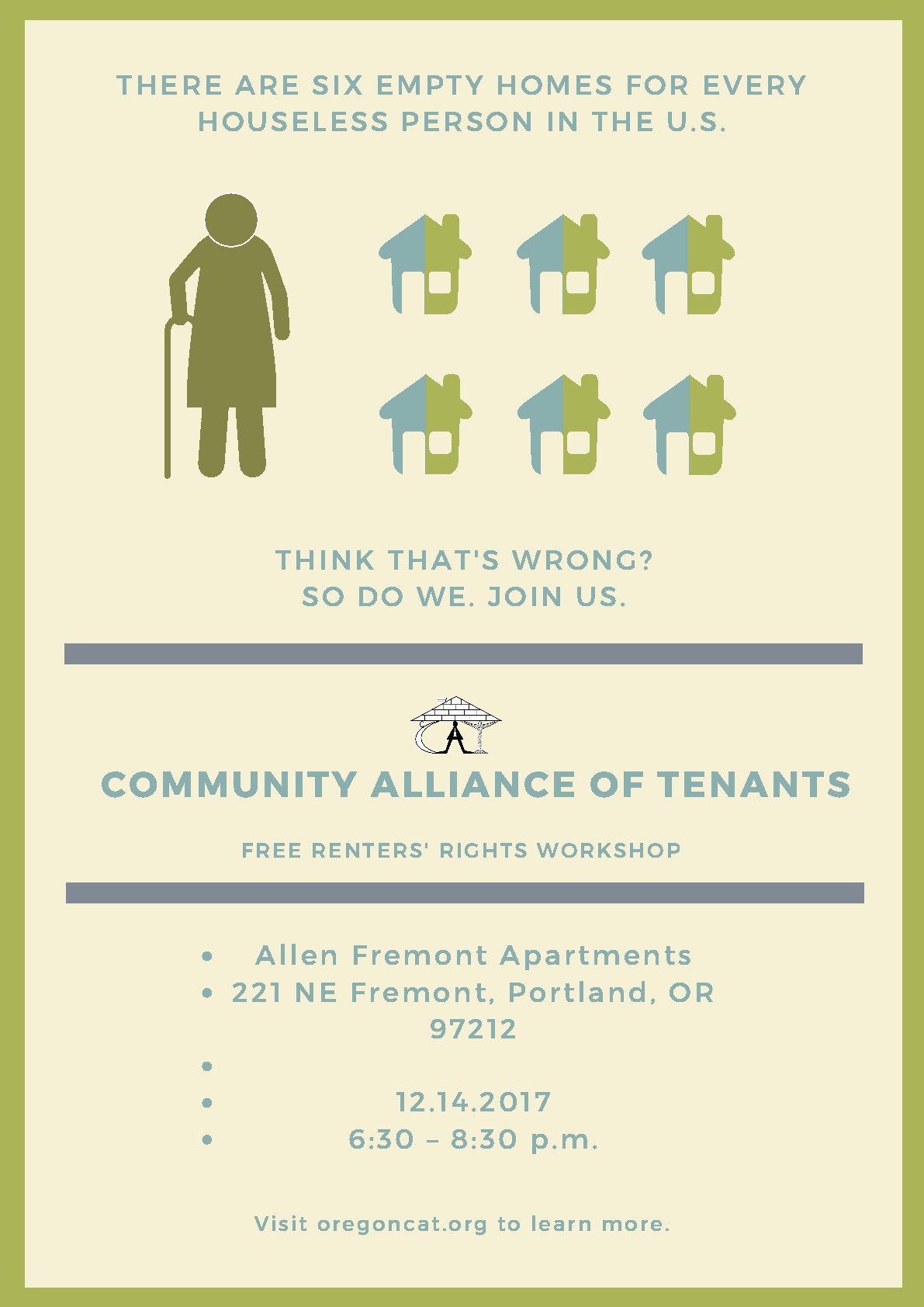


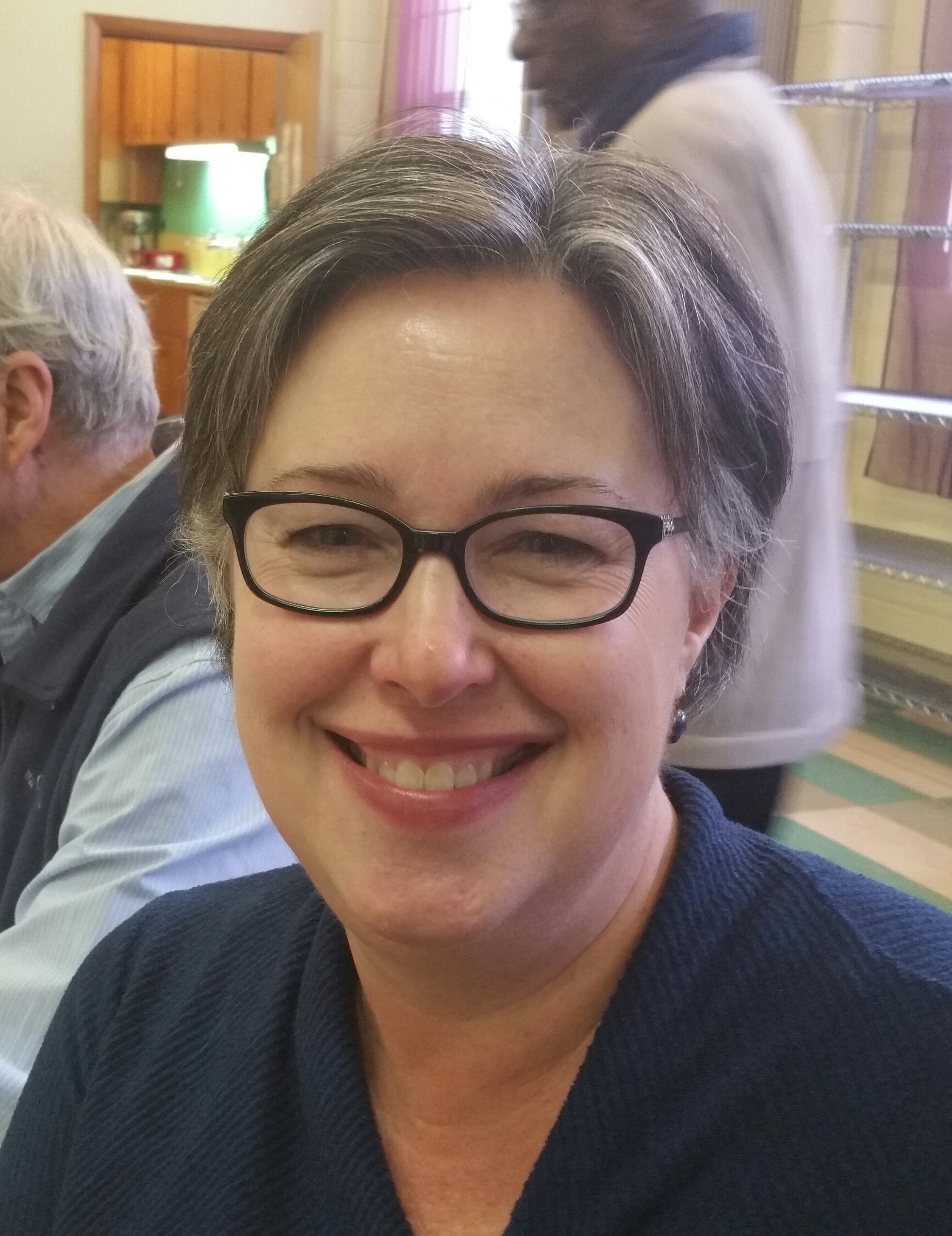 Beth Neel, Pastor at Westminster Presbyterian Church will host the December Interfaith Alliance Meeting, to be held at Westminster Presbyterian Church, 1624 NE Hancock, on Thursday, December 7, at 12:00 PM.
Beth Neel, Pastor at Westminster Presbyterian Church will host the December Interfaith Alliance Meeting, to be held at Westminster Presbyterian Church, 1624 NE Hancock, on Thursday, December 7, at 12:00 PM.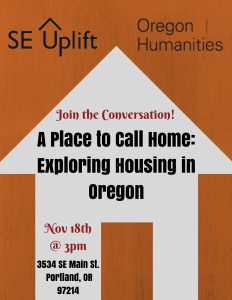
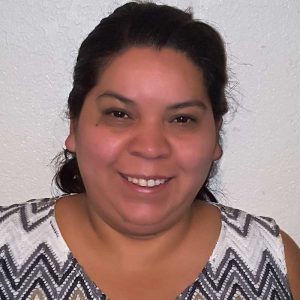


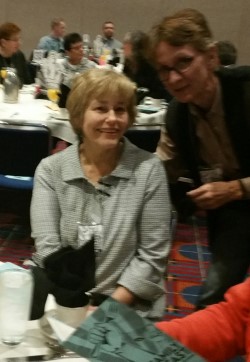 Hundreds of Street Roots supporters gathered at the Portland Convention Center on October 5, 2017, including several members of the Interfaith Alliance on Poverty. Shown above are Tom Hering, Rose City Presbyterian Church, Dave Albertine, the Madeleine Catholic Parish, Holly Schmidt, Westminster Presbyterian Church, Carol Turner, Westminster Presbyterian Church, and Sarabelle Hitchner, First Unitarian Church.
Hundreds of Street Roots supporters gathered at the Portland Convention Center on October 5, 2017, including several members of the Interfaith Alliance on Poverty. Shown above are Tom Hering, Rose City Presbyterian Church, Dave Albertine, the Madeleine Catholic Parish, Holly Schmidt, Westminster Presbyterian Church, Carol Turner, Westminster Presbyterian Church, and Sarabelle Hitchner, First Unitarian Church. Street Roots Newspaper Seller, Lori Lematta, and Executive Director, Israel Bayer
Street Roots Newspaper Seller, Lori Lematta, and Executive Director, Israel Bayer